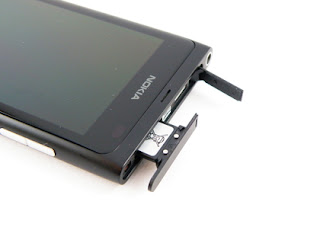The Nokia Lumia 800 is the first Windows Phone handset to spring from the Microsoft / Nokia tie-up announced in February, and we've got our hands on an early sample to check it out.
The Lumia 800 is Nokia's first Windows Phone powered smartphone and has a 3.7-in AMOLED display and an 8MP camera.
The Nokia Lumia 800 shares its exterior styling with the previously substantially less hyped Nokia N9, a Meego-based smartphone, although the screen size is reduced from 3.9" (854x480 pixels) to 3.7" (800x480 pixels) to conform to the Windows Phone spec list.
LOOKS:
The Lumia 800 is available in three colours – Black, Fuschia and Cyan. It has a polycarbonate body which makes it scratch-resistant. The 3.7-inch glass display has a layer of Corning Gorilla Glass. It has got the perfect sleek and stylish look which will appeal to professionals as well as all those who take ‘style with substance’ as their motto.
Product Summary Lumia 800
For > Quality design
> Clever interface
> Speedy browser
> Intuitive contact linking
> Xbox integration
> Xbox integration
Against
> Nokia Maps still not functional
> Internet text display dodgy at times
> No Flash video
> Zune player takes ages to copy video across
> Mix Radio downloads unavailable
> No Flash video
> Zune player takes ages to copy video across
> Mix Radio downloads unavailable
Pros:
- Very Stylish Looks
- Great Touch Response & UI
- Solid Build Quality
- Good Battery Life
- Nokia Navigation Suite
Cons:
- Average Camera
- Software has Bugs
- Heavy Reliance on Zune Software on PC
Features
To make sure that they are competitive in this new race, Nokia has given the Lumia 800 best-in-class specs. The Lumia is powered by a 1.4GHz Qualcomm processor and 512MB of RAM and has 16GB of internal storage. However, the Lumia doesn't support external memory so you'll have to make do with the built-in memory. The Lumia sports a 3.7-in AMOLED display with a resolution of 800x480 pixels. Imaging is taken care of by an 8MP autofocus camera with a dual-LED flash. Unlike most phones in its price-range, the Lumia strangely doesn't have a front-facing camera for video chats.
Connectivity options on the Lumia 800 include GPS, Wi-Fi and 3G (HSDPA 14.4Mbps, HSUPA 5.76Mbps) support. It uses a microUSB cable to connect to the PC and charge. The Lumia 800 also uses a microSIM card, so you'll have to either get yourself a new microSIM or get your regular SIM cut down.

Now that Nokia has adopted Windows Phone, the Lumia 800 will serve as an introduction to the new OS for a whole lot of people. Windows Phone is closer to iOS than Android with respect to the fact that it simplifies a whole lot of things while removing some extra options. However, it's very different looking and feels very different to use in a good way. Windows Phone will especially suit first-time smartphone users, and if you've been using non-touch feature phones so far, Windows Phone is a very good introduction to the smartphone OS because, most importantly, it doesn't compromise on usability.
Unlike Android, the Windows Phone UI (known as Metro) doesn't rely on multiple homescreens or widgets of different sizes. Instead you have one vertical scrolling homescreen on which you can pin anything from a contact, a website, a song, a video etc. Everything is pinned to the homescreen as a tile- a square/rectangular icon. Some of the tiles are static and work as a simple button while some tiles (such as the e-mail tile, people tile etc.) work as widgets and display real-time updates/notifications or animation. Removing a tile from the homescreen is as easy as holding down on the tile and choosing the remove option from the drop-down menu. Pinning anything to the homescreen is also equally simple.
PERFORMANCE:
Battery life is average. The Call clarity too is average too. The touch screen device that runs on Windows Phone 7.5 - Mango operating System has a restrained processor. It has a 1.4 Ghz Qualcomm MSM 8255 single-core processor with 512MB of RAM.














